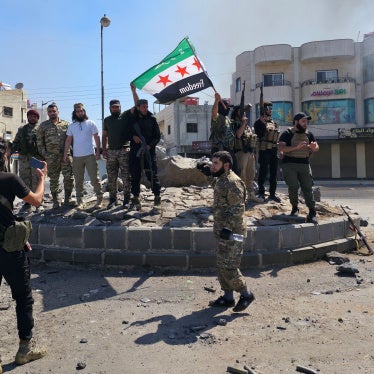Dear Mr. Blatter,
We write to ask whether FIFA is taking any steps to integrate human rights provisions in its Statute and contract requirements for future FIFA World Cup hosts, similar to those recently adopted by the International Olympic Committee, and to request an early meeting with you to discuss this and other human rights concerns, notably continued discrimination that bars women and girl spectators from attending football matches in Iran.
As you will be aware, the IOC under President Thomas Bach, recently agreed to make two important changes to its host city contracts, in accordance with recommendations made by Human Rights Watch and other monitors: the inclusion of a non-discrimination clause in the wake of major protests against Russia’s anti-LGBT laws and negative media coverage that marred the Sochi Olympics, and the inclusion of other human rights protections in order to ascertain that future host cities—unlike Beijing or Sochi—will respect the Fundamental Principles laid out in the Olympic Charter. Further recommendations are included in Human Rights Watch’s submission to the IOC’s “Olympic Agenda 2020,” that was debated at the December 2014 IOC session in Monaco.
We were encouraged to note your tweet of September 16 that “FIFA’s reform process gives us a framework for the future that I believe will put FIFA at the forefront of governance standards in sport.” We would welcome receiving more details of this reform process, particularly whether FIFA plans to promptly introduce changes similar to those adopted by the IOC. We believe that it would certainly be timely for FIFA to do so.
Qatar’s preparations to host the 2022 FIFA World Cup have already been marred by multiple abuses against migrant workers, as Human Rights Watch documented in its 2012 report, Building a Better World Cup. The abuses including exorbitant recruitment fees that can take several years for workers to pay back; the routine confiscation of workers’ passports by employers; and Qatar’s restrictive Kafala sponsorship system that gives employers inordinate control over the workers – still persist. Collectively, these abuses can amount to conditions of forced labor.
In Iran, we are concerned about continuing official discrimination that bars women and girls from attending football matches as spectators, a policy that the Iranian authorities have maintained since the 1980s. The policy also extends to certain other sporting events, including volleyball matches, as highlighted by the recent case of Ghoncheh Ghavami, a dual Iranian-British national who is currently on bail in Tehran awaiting the outcome of her appeal against a prison sentence and travel ban. Iranian authorities arrested Ghavami on June 30, 2014 after she participated in a peaceful protest against a ban on women and girls attending volleyball matches. Subsequently, a court convicted her on the charge of “propaganda against the state” imposing a one year prison term and a two year ban on travel abroad.
Saudi Arabia also bans women from attending public sporting events as spectators in order to prohibit gender mixing. In December 2014, the Saudi Gazette reported that authorities arrested a Saudi woman for attending a football match in Jeddah disguised as a man.
In light of the foregoing, Human Rights Watch requests your response to the following questions:
- What procedures, if any, are in place to allow FIFA to raise concerns regarding violations of the principle of non-discrimination based on race, gender, ethnicity, religion or other grounds, by member states or federations, such as the Iranian Football Federation?
- Has FIFA raised concerns regarding Iran and Saudi Arabia’s continuing policy of banning women from watching football matches with the relevant authorities or the respective football federation? If so, when were these concerns raised and with whom, and what was the nature of the concerns expressed and/or assurances sought? If FIFA has not raised any concerns, does it now plan to do so, or if not, why not?
- What action, if any, will FIFA take if the Iranian and Saudi authorities persist with their discriminatory practice of banning women and girls from attending football matches as spectators? What sanctions are available to FIFA to levy against the national football federations in such circumstances, and what procedures are required within FIFA to initiate, and to impose, such sanctions?
We would appreciate receiving your prompt response to these questions.
We would also welcome an early meeting with you in order to discuss these matters further as well as to brief you on Human Rights Watch’s proposals for integrating human rights norms and non-discrimination into the FIFA Charter, and ongoing human rights concerns in relation to the 2022 FIFA World Cup in Qatar.
We thank you for letting us know your availability for such a meeting. To submit your response to our queries or to arrange a meeting, please do not hesitate to contact my colleague Sarkis Balkhian at balkhis@hrw.org.
Sincerely,
Sarah Leah Whitson
Executive Director
Middle East and North Africa Division
Human Rights Watch








